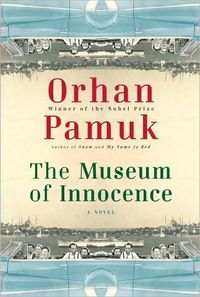

Purchase
The Museum of Innocence
Orhan Pamuk
Knopf
November 2009
On Sale: October 27, 2009
580 pages
ISBN: 0307266761
EAN: 9780307266767
Hardcover
Add to Wish List
Fiction Family Life
“It was the happiest moment of my life, though I didn’t
know it.” So begins the new novel, his first since winning
the Nobel Prize, from the universally acclaimed author of
Snow and My Name Is Red. It is 1975, a perfect spring in
Istanbul. Kemal, scion of one of the city’s wealthiest
families, is about to become engaged to Sibel, daughter of
another prominent family, when he encounters Füsun, a
beautiful shopgirl and a distant relation. Once the long-
lost cousins violate the code of virginity, a rift begins
to open between Kemal and the world of the Westernized
Istanbul bourgeosie—a world, as he lovingly describes it,
with opulent parties and clubs, society gossip, restaurant
rituals, picnics, and mansions on the Bosphorus, infused
with the melancholy of decay—until finally he breaks off
his engagement to Sibel. But his resolve comes too late. For
eight years Kemal will find excuses to visit another
Istanbul, that of the impoverished backstreets where Füsun,
her heart now hardened, lives with her parents, and where
Kemal discovers the consolations of middle-class life at a
dinner table in front of the television. His obsessive love
will also take him to the demimonde of Istanbul film
circles (where he promises to make Füsun a star), a scene
of seedy bars, run-down cheap hotels, and small men with
big dreams doomed to bitter failure. In his feckless
pursuit, Kemal becomes a compulsive collector of objects
that chronicle his lovelorn progress and his afflicted
heart’s reactions: anger and impatience, remorse and
humiliation, deluded hopes of recovery, and daydreams that
transform Istanbul into a cityscape of signs and specters
of his beloved, from whom now he can extract only
meaningful glances and stolen kisses in cars, movie houses,
and shadowy corners of parks. A last change to realize his
dream will come to an awful end before Kemal discovers that
all he finally can possess, certainly and eternally, is the
museum he has created of his collection, this map of a
society’s manners and mores, and of one man’s broken heart. A stirring exploration of the nature of romantic attachment
and of the mysterious allure of collecting, The Museum of
Innocence also plumbs the depths of an Istanbul half
Western and half traditional—its emergent modernity, its
vast cultural history. This is Orhan Pamuk’s greatest
achievement.
Comments
1 comment posted.
Re: The Museum of Innocence
The small "classification" says non-fiction - but the second sentence starts "So begins the new novel...
(Ruth Hemingosn 1:46pm October 28, 2009)
Registered users may leave comments.
Log in or register now!
| 


 © 2003-2025 off-the-edge.net
all rights reserved Privacy Policy
© 2003-2025 off-the-edge.net
all rights reserved Privacy Policy